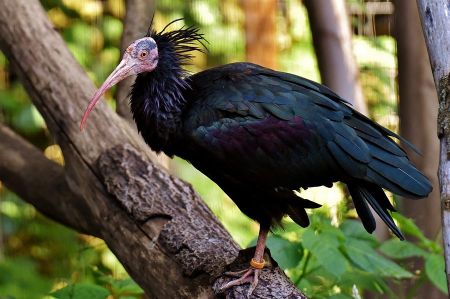Northern Bald Ibis: GPS transmitters with artificial intelligence
- Written by Portal Editor
Northern Bald Ibis are breeding again in Germany and Austria. 51 of the endangered ibis birds have safely mastered the more than 800-kilometer flight from their winter quarters in Italy.
More than 30 eggs are already in the nests in their breeding areas in Überlingen on Lake Constance in Baden-Württemberg, in Burghausen in Bavaria and in Kuchl and Rosegg in Austria. In Überlingen, some animals have adopted a natural rock niche as a nesting place for the first time - a special success for the conservationists of the Northern Bald Ibis-team support association. Because it shows that this generation of birds can already cope without human care, while part of the previous generation was still dependent on humans. The first young birds have already hatched. But some Northern Bald Ibis - which all have a name, by the way - are sorely missed by the carers of the Northern Bald Ibis-team support association and by their fellow Northern Bald Ibis, because Northern Bald Ibis are very social birds. They were killed illegally - some presumably, some demonstrably.
Northern Bald Ibis poaching: GPS transmitters with artificial intelligence can help catch perpetrators
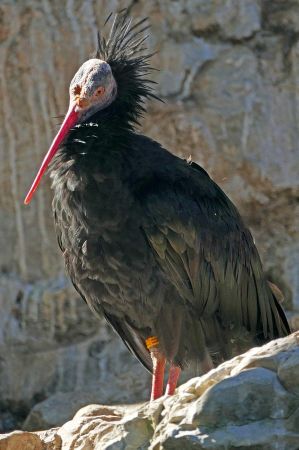 One of them was the male Northern Bald Ibis Enea from the Überlingen colony: Enea died in March in Italy on the return flight to his breeding ground in Switzerland. All indications suggest that he was shot. The male Northern Bald Ibis Eugen, Diego and Lenz were also killed in Italy. The researchers know this because they accompany most of the animals on their journey using GPS transmitters. Around 80 percent of all Northern Bald Ibis birds from the Northern Bald Ibis-team support association now carry high-tech GPS transmitters on their backs. The transmitters transmit the birds' positions in real time to a database; location, flight data such as altitude and speed, as well as spatial orientation can be called up regularly. "GPS is one of the most important tools for tracking the birds' flight routes and perhaps also for tracking bird hunters better in the future," says Prof. Klaus Hackländer, chairman of the German Wildlife Foundation. The foundation supports the Northern Bald Ibis-team by purchasing GPS transmitters.
One of them was the male Northern Bald Ibis Enea from the Überlingen colony: Enea died in March in Italy on the return flight to his breeding ground in Switzerland. All indications suggest that he was shot. The male Northern Bald Ibis Eugen, Diego and Lenz were also killed in Italy. The researchers know this because they accompany most of the animals on their journey using GPS transmitters. Around 80 percent of all Northern Bald Ibis birds from the Northern Bald Ibis-team support association now carry high-tech GPS transmitters on their backs. The transmitters transmit the birds' positions in real time to a database; location, flight data such as altitude and speed, as well as spatial orientation can be called up regularly. "GPS is one of the most important tools for tracking the birds' flight routes and perhaps also for tracking bird hunters better in the future," says Prof. Klaus Hackländer, chairman of the German Wildlife Foundation. The foundation supports the Northern Bald Ibis-team by purchasing GPS transmitters.
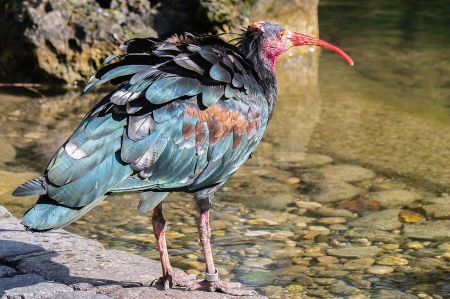 If a GPS transmitter transmits suspicious data, such as an unusual position of the Northern Bald Ibis body axis, this indicates that a bird is not flying or standing upright, but is lying down. "If we notice that a Northern Bald Ibis has obviously died, we always call the local police and ask if they can collect the body. Only through the police can we pursue a criminal case," says Laura Stefani from the Northern Bald Ibis-team support association. It happens that the officers find the birds in meadows or fields - with shotgun pellets in their bodies. Sometimes the GPS transmitter shows the perpetrator's garage as the last location. But if the perpetrator denies everything, the burden of proof lies with the scientists. A laborious and often frustrating business: "The perpetrators have almost always gotten away with it. In the past twelve years we have been able to prove 52 illegal shootings - but only one poacher was convicted," says Stefani.
If a GPS transmitter transmits suspicious data, such as an unusual position of the Northern Bald Ibis body axis, this indicates that a bird is not flying or standing upright, but is lying down. "If we notice that a Northern Bald Ibis has obviously died, we always call the local police and ask if they can collect the body. Only through the police can we pursue a criminal case," says Laura Stefani from the Northern Bald Ibis-team support association. It happens that the officers find the birds in meadows or fields - with shotgun pellets in their bodies. Sometimes the GPS transmitter shows the perpetrator's garage as the last location. But if the perpetrator denies everything, the burden of proof lies with the scientists. A laborious and often frustrating business: "The perpetrators have almost always gotten away with it. In the past twelve years we have been able to prove 52 illegal shootings - but only one poacher was convicted," says Stefani.
Often the birds are simply left lying in a field or in the mountains after being shot
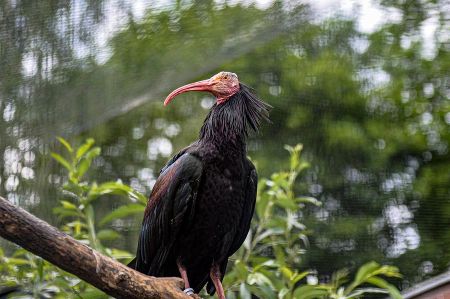 In Italy, illegal hunting of birds has a long tradition. Hotspots are in Apulia, Sicily, Sardinia, on the southern Tyrrhenian coast, in the Po Delta and in the valleys of Brescia in Lombardy. "43 percent of cases occur in these areas. The shootings of the bald ibis are just the tip of the iceberg: up to 6 million birds, including birds of prey and storks, are illegally killed, held or caught in Italy every year," says Stefani. Often the birds are simply left lying in a field or in the mountains after being shot.
In Italy, illegal hunting of birds has a long tradition. Hotspots are in Apulia, Sicily, Sardinia, on the southern Tyrrhenian coast, in the Po Delta and in the valleys of Brescia in Lombardy. "43 percent of cases occur in these areas. The shootings of the bald ibis are just the tip of the iceberg: up to 6 million birds, including birds of prey and storks, are illegally killed, held or caught in Italy every year," says Stefani. Often the birds are simply left lying in a field or in the mountains after being shot.
At least: The technical tools that help conservationists to set limits on the illegal killing of protected animals are getting better and better. This was reported by experts who recently met at a symposium on measures against illegal bird hunting in Verona, northern Italy. It was part of the European project LIFE Northern Bald Ibis (LIFE20 NAT/AT/000049 - LIFE NBI). In the future, GPS transmitters with artificial intelligence and new technology could help with the investigation.
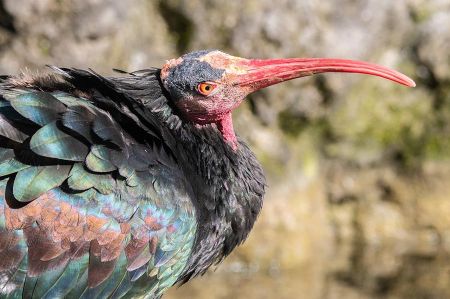 "For example, if a transmitter were equipped with tiny cameras or microphones that automatically switch on as soon as a bird gets into a dangerous situation, bird hunters could be identified more quickly after an act," says Laura Stefani. "In addition to modern technology, the legal framework must also be improved in order to prosecute wildlife crime," says the bald ibis conservationist. "Every year we therefore send a report on the illegal killing of the bald ibis to the Italian authorities, in which we urgently request support and cooperation in the fight against illegal shootings."
"For example, if a transmitter were equipped with tiny cameras or microphones that automatically switch on as soon as a bird gets into a dangerous situation, bird hunters could be identified more quickly after an act," says Laura Stefani. "In addition to modern technology, the legal framework must also be improved in order to prosecute wildlife crime," says the bald ibis conservationist. "Every year we therefore send a report on the illegal killing of the bald ibis to the Italian authorities, in which we urgently request support and cooperation in the fight against illegal shootings."
The conservationist knows that only together with the Italian authorities and by educating the Italian population can we succeed in protecting the rare Northern Bald Ibis and supporting the valuable work of the Northern Bald Ibis-team.
Jennifer Calvi
Deutsche Wildtierstiftung
Please read as well:
